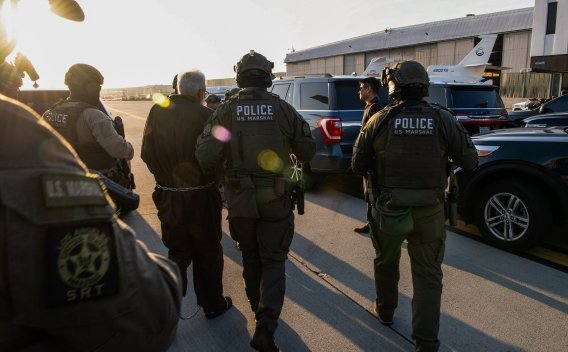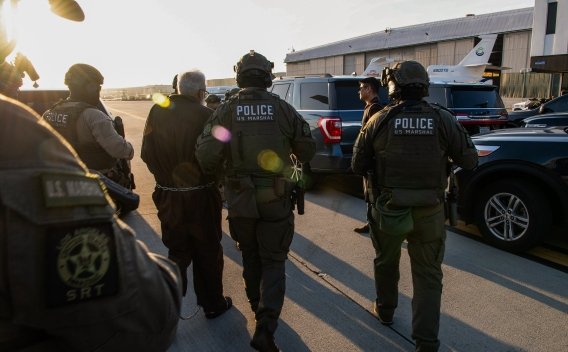
Extradition of Tahawwur Rana: A Significant Development in US-India Relations
In a landmark event, the United States has officially extradited Tahawwur Rana to India. This significant development has been highlighted through visuals released by the U.S. Marshals Service, depicting the transfer of Rana’s custody from U.S. authorities to Indian officials. This moment marks a crucial step in the ongoing collaboration between the U.S. and India in combating terrorism and ensuring justice for the victims of heinous crimes.
Who is Tahawwur Rana?
Tahawwur Rana is a Canadian citizen of Indian origin who has been involved in controversial activities linked to terrorism. He was previously charged in connection with the 2008 Mumbai attacks, which left over 160 people dead and injured many more. Rana was allegedly associated with the Pakistan-based terrorist organization Lashkar-e-Taiba, which orchestrated the attacks. His extradition to India is seen as a pivotal move in addressing the long-standing grievances related to these terrorist activities and holding those accountable who play a role in them.
The Extradition Process
The extradition process for Rana has been closely monitored by both the U.S. and Indian governments. The U.S. Marshals Service played a critical role in facilitating his transfer, as depicted in the images shared on social media. These visuals show U.S. Marshals in the Central District of California handing over Rana to Indian authorities, symbolizing a collaborative effort to ensure that justice is served.
Extraditions between countries often involve complex legal frameworks, and the successful transfer of Rana indicates a robust legal agreement between the two nations. This extradition is not only a victory for the Indian judicial system but also reinforces the commitment of the U.S. to work alongside its allies in tackling global terrorism.
- YOU MAY ALSO LIKE TO WATCH THIS TRENDING STORY ON YOUTUBE. Waverly Hills Hospital's Horror Story: The Most Haunted Room 502
Implications for U.S.-India Relations
The extradition of Rana is poised to have far-reaching implications for U.S.-India relations. It demonstrates a strong partnership in law enforcement and counter-terrorism efforts. This collaboration is essential, especially considering the increasing threats posed by terrorism in various parts of the world.
Furthermore, this event is likely to strengthen diplomatic ties between the two countries. By successfully extraditing an alleged terrorist, the U.S. signals its dedication to cooperating with India in matters of national security. This act could pave the way for future collaborations in intelligence sharing, military cooperation, and joint counter-terrorism initiatives.
The Response from India
India has welcomed the extradition of Rana, viewing it as a significant step toward justice for the victims of the Mumbai attacks. Indian officials have expressed their gratitude to the U.S. government for its efforts in facilitating this transfer. The Indian legal system is now prepared to prosecute Rana for his alleged involvement in terrorist activities, aiming to hold him accountable for his actions.
The Wider Context of Terrorism
Rana’s extradition is set against a backdrop of increasing global awareness and action against terrorism. Countries around the world are increasingly recognizing the need for collaborative efforts to combat this pervasive threat. The international community is becoming more vigilant and proactive in addressing the challenges posed by extremist groups.
As nations unite against the common enemy of terrorism, the extradition of individuals like Rana serves as a reminder of the importance of international cooperation. It highlights the need for countries to work together to dismantle terrorist networks and prevent future attacks.
Conclusion
The extradition of Tahawwur Rana from the U.S. to India marks a pivotal moment in the fight against terrorism. It symbolizes the commitment of both nations to uphold justice and work collaboratively in addressing security challenges. The successful transfer of custody not only reinforces the strength of U.S.-India relations but also serves as a model for international cooperation in combating terrorism.
As the legal proceedings against Rana commence in India, the world will be watching closely. This case serves as a reminder of the ongoing struggle against terrorism and the importance of holding those responsible accountable for their actions. The extradition, therefore, is not just a legal victory; it is a significant step towards ensuring a safer future for all nations.
This development underscores the need for continued vigilance and cooperation among countries to combat the persistent threat of terrorism. With nations working hand in hand, there is hope for a world where justice prevails, and the innocent are protected from the scourge of extremist violence.

Breaking: US releases pics of Tahawwur Rana being extradited to India. U.S. Marshals in the Central District of California transferring his custody to the Indian side.
Pc: U.S. Marshals Service photo by Shane T. McCoy pic.twitter.com/9c4vql5KkY
— Sidhant Sibal (@sidhant) April 11, 2025
Breaking: US Releases Pics of Tahawwur Rana Being Extradited to India
In a significant development, the U.S. has officially released photographs of Tahawwur Rana being extradited to India. The images showcase U.S. Marshals in the Central District of California transferring his custody to Indian authorities. This moment marks a pivotal point in an ongoing legal saga that has drawn international attention. The U.S. Marshals Service provided these compelling visuals, captured by Shane T. McCoy, which illustrate the seriousness of the situation.
The Background of Tahawwur Rana’s Case
To truly understand the weight of this extradition, it’s essential to delve into the background of Tahawwur Rana. Rana, a Canadian citizen of Pakistani descent, was previously arrested in the United States for his alleged involvement in a terrorist plot. His connection to the 2008 Mumbai attacks, which resulted in the loss of many lives, makes this case particularly notable. Over the years, Rana has faced numerous legal challenges, and his extradition to India has been a contentious issue, sparking debate over international law and anti-terrorism measures.
The legal proceedings surrounding Rana have been complex, involving multiple jurisdictions and layers of legal frameworks. His extradition is seen as a victory for Indian authorities, who have long sought justice for the victims of the Mumbai attacks. The cooperation between U.S. and Indian law enforcement agencies in this matter highlights the importance of international collaboration in combating terrorism.
Why This Extradition Matters
The extradition of Tahawwur Rana is not just a legal maneuver; it carries significant implications for international relations and anti-terrorism efforts. By transferring Rana to India, the U.S. is reaffirming its commitment to combating terrorism on a global scale. This act serves as a message that individuals involved in terrorist activities will be held accountable, regardless of their nationality or where the crimes were committed.
Moreover, this case underscores the importance of diplomatic ties between the United States and India. Both nations have faced the threat of terrorism and recognize the need for a united front in addressing this issue. The successful extradition of Rana could pave the way for further cooperation in matters of security and law enforcement.
The Role of U.S. Marshals in the Extradition Process
U.S. Marshals play a critical role in the extradition process. Their involvement ensures that individuals like Rana are transferred safely and securely between jurisdictions. The Marshals are known for their professionalism and expertise in handling high-profile cases. In this instance, their actions reflect the seriousness with which the U.S. government takes extradition requests from allied nations.
The photo released by the U.S. Marshals Service captures the essence of this process. It shows the meticulous care and attention given to the transfer of custody, reinforcing the idea that legal processes are taken seriously. The professionalism displayed by the U.S. Marshals can instill confidence in the public regarding the integrity of the legal system.
What Happens Next for Tahawwur Rana?
Now that Tahawwur Rana has been extradited to India, he will face legal proceedings in connection with the Mumbai attacks. The Indian legal system will take its course, and Rana will have the opportunity to defend himself against the charges brought forth. However, given the gravity of the allegations, the process is expected to be lengthy and complex.
The outcome of Rana’s case could have significant implications for India’s approach to terrorism. If convicted, he could face substantial prison time, sending a clear message that those who engage in or support terrorist activities will be pursued relentlessly. The case will likely draw considerable media attention, with updates on his trial expected to be widely reported.
Public Reaction to the Extradition
Public reaction to the extradition of Tahawwur Rana has been mixed. Many in India view this as a long-awaited step towards justice, especially for the families of the victims of the Mumbai attacks. The sense of closure that this extradition represents is palpable, and for many, it signifies a commitment to ensuring that justice is served.
On the other hand, some individuals express concerns over the fairness of the legal proceedings that Rana will face in India. Questions surrounding human rights and the treatment of prisoners in India have been raised, highlighting the complexities of international law and extradition. It’s a topic that prompts discussions on the balance between justice and human rights in the fight against terrorism.
The Importance of International Cooperation
The extradition of Tahawwur Rana exemplifies the critical need for international cooperation in the fight against terrorism. Terrorism knows no borders, and the complexities of global crime require nations to work together to address these challenges. The successful transfer of Rana from the U.S. to India showcases the effectiveness of collaborative efforts between countries.
Such cooperation is essential not only for the legal aspects but also for intelligence sharing and joint operations against terrorist networks. The extradition serves as a reminder that nations must unite to eliminate the threat posed by terrorism and ensure that justice is served for the victims.
Looking Ahead: The Future of Extradition Laws
The case of Tahawwur Rana may prompt discussions regarding the future of extradition laws and treaties. As global crime becomes increasingly sophisticated, countries must adapt their legal frameworks to address the evolving landscape of international crime. This case could serve as a catalyst for reform in extradition laws, promoting more streamlined processes and enhanced cooperation between nations.
Moreover, the growing interconnectedness of the world underscores the necessity for nations to prioritize diplomatic relations and work towards common goals in combating terrorism. As countries continue to navigate the complexities of international law, the importance of establishing clear and fair extradition processes will become increasingly evident.
Conclusion
The extradition of Tahawwur Rana is a significant milestone in the ongoing battle against terrorism. It highlights the complexities of international law, the importance of cooperation between nations, and the pursuit of justice for victims of heinous crimes. As Rana faces the Indian legal system, the world will be watching closely, eager to see how this case unfolds and what it means for the future of international cooperation in fighting terrorism.
The images released by the U.S. Marshals Service serve as a powerful reminder of the seriousness of this situation, and the commitment of nations to work together to ensure that justice prevails. Whether through legal means or international diplomacy, it is clear that the fight against terrorism is far from over, and the world must remain vigilant in its pursuit of peace and justice.
